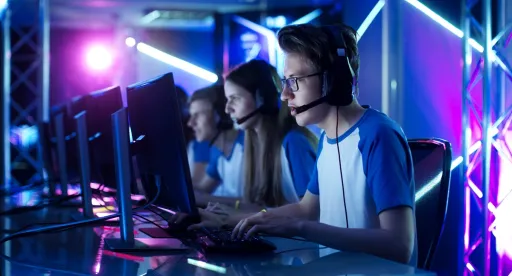Introduction and Background
In its statement published at the end of last year regarding the disciplinary action taken against Alexey Shyshko, the Esports Integrity Commission (ESIC) pronounced that Shyshko’s actions had “tarnished the reputation of esports as a whole” and “threatened the very foundation of fair competition in esports”.[1] ESIC’s public statement accompanied a lifetime ban for Shyshko and additional sanctions on teams and individuals associated with him.
This article considers an overview of Shyshko’s activities leading to the sanctions meted out, the role of ESIC and what conclusions can be drawn from this case amidst the wider context of preserving the integrity of competition in esports.
As the commercial profile of esports has grown and betting markets for the sector have become more popular and expansive, it is not surprising that the industry has had to confront the risk of betting-related corruption and match-fixing, as traditional sports have had to do. Since the first major scandal in South Korea in 2010, which resulted in twelve StarCraft 2 professionals being arrested over charges of match-fixing and illegal betting, there have been various incidents of varying degrees of severity. However, the lifetime ban handed down to Shyshko is an unprecedented sanction.
Factual Circumstances of Shyshko’s Case
Alexey Shyshko was proprietor of various professional esports teams, including Akuma, Majesty and Project X. ESIC’s investigation found that Shyshko had misused his position as proprietor to manipulate match outcomes for financial gain and to provide unfair advantages to his teams in competitive play.[2] ESIC’s investigation was launched following: receipt of information from confidential sources; disclosure of betting evidence provided by ESIC’s Anti-Corruption Supporters; and match analysis provided by ESIC member tournament organisers.
Two particular incidents disclosed in ESIC’s public statement involved a match-fixing arrangement during a Bulgarian LAN event in 2020 and the facilitation of cheating at the CS:GO tournament “Time of Bet Cup”. The former incident involved the direct manipulation by Shyshko of match outcomes with the promise of financial gain for participating players from Team Majesty, which he owned and controlled. The latter incident involved Shyshko providing Team Majesty with unauthorised communication methods, which gave his team an unfair advantage.
ESIC’s investigation found that Shyshko had breached both the ESIC Code of Conduct and the ESIC Anti-Corruption Code.[3] Similarly, ESIC’s investigation found that several individuals from Shyshko’s Project X and Majesty teams had also breached ESIC’s Anti-Corruption Code as a result of their involvement in match-fixing activities. These individuals ended up receiving a two-year Rejection Order prohibiting them from competing in any ESIC member events, whilst, as mentioned above, Shyshko himself ended up receiving a lifetime ban.
Role of ESIC
ESIC is a not-for-profit members’ association established in 2015 by key esports stakeholders to protect the integrity of esports competition.[4] In so doing, it also supports its commercial viability and growth, and protects esports participants (particularly its younger players). ESIC has developed an ‘off the shelf’ Integrity Program which can be incorporated into event organisers’ own rules and regulations. [5] It incorporates, amongst other things, a Code of Ethics, a Code of Conduct, an Anti-Corruption Code, an Anti-Doping Code and a Disciplinary Procedure. These policies and procedures provide benchmarks for the industry and, by signing up to ESIC’s program, ESIC’s members agree to adopt its policies and procedures.
A broad range of industry stakeholders have enlisted in ESIC’s program. These include tournament operator members (such as ESL, BLAST and WePlay Esports), national federations (such as the European Esports Federation, Swiss Esports Federation and New Zealand Esports Federation), supporting and official partners (such as Intel, Videogames and Esports Foundation and Esports Insider).[6] In addition, several betting operators (such as Entain, Betway and Pinnacle), daily fantasy sports operators (such as Prize Picks) and other gambling industry stakeholders have signed up to ESIC’s Program as Anti-Corruption Supporters. Data providers (such as Data Bet and Pandascore) have also signed up as Official Data Partners.
Several gambling regulators have partnered with ESIC – in particular, the GB Gambling Commission, the Isle of Man Gambling Supervision Commission, the Nevada State Gaming Control Board and the Malta Gaming Authority. It is important to note, however, that Betting Operator Anti-Corruption Supporters do not vote on the direction of ESIC, but are nevertheless aligned with preventing betting fraud in esports.[7]
In terms of bans imposed by ESIC, these are effective across its members but ESIC also requests that non-ESIC member tournament organisers honour the bans that it imposes. In its investigations (such as in the Shyshko case), ESIC reviews information (including betting evidence for suspicious betting patterns) provided by its Anti-Corruption Supporters, as well as match analysis (including from server data) by experts from ESIC member tournament organisers. Such expert analysis considers, amongst other things, unusual player behaviour (including actions too fast to be made by a human), anti-cheat algorithms and other suspicious behaviour. ESIC also investigates and sanctions reported corruption, match-manipulation, doping and any other breaches of sporting integrity. As is demonstrated in the Shyshko case, its sanctions focus on exclusion of the perpetrators from esports events, although it can also liaise with law enforcement bodies as appropriate and necessary. For example, since February 2023, ESIC has had a “letter of arrangement” in place with Victoria Police, Australia.[8] This allows the Sporting Integrity Intelligence Unit of the police force to receive real-time betting alerts from ESIC on esports events, should any matches exhibit suspicious betting activity. This means that investigations can be made as soon as possible following an alert.
Concluding thoughts and takeaways
Since there are no overarching governing bodies in esports which regulate esports in the same way that there are in traditional sports, ESIC plays a valuable role in promoting standards for integrity of competition in the industry. It is also encouraging to see the positivity with which its integrity benchmarks have been adopted by a broad range of industry stakeholders, as well as the support provided by gambling operators, fantasy sports providers and data partners. However, whilst ESIC’s program is at an umbrella level, some have advocated that there is further scope for a greater focus on policies and procedures more particularly tailored to specific games and titles. The latter would tend to focus on software & hardware issues, exploitation of in-game bugs and glitches, and server attacks, which would be more publisher-led and complement the more overarching program developed by ESIC.
The lifetime ban imposed on Mr Shyshko is testament to ESIC’s recognition of the crucial role that preservation of sporting integrity plays in the continued development of esports as an industry (both commercially and otherwise). However, whether such sanction acts as the deterrent it is intended to be remains to be seen. The effectiveness of the deterrent will, to some extent, rely on the resources which ESIC can employ in investigating the breaches that are reported to it, and the support provided from its network of members, partners and suppliers.
[1] Public Statement on Disciplinary Action Against Participant Alexey Shyshko, ESIC, https://esic.gg/sanction-outcome/public-statement-on-disciplinary-action-against-participant-alexey-shyshko/ (December 4, 2023)
[2] Public Statement on Disciplinary Action Against Participant Alexey Shyshko, ESIC, https://esic.gg/sanction-outcome/public-statement-on-disciplinary-action-against-participant-alexey-shyshko/ (December 4, 2023)
[3] Public Statement on Disciplinary Action Against Participant Alexey Shyshko, ESIC, https://esic.gg/sanction-outcome/public-statement-on-disciplinary-action-against-participant-alexey-shyshko/ (December 4, 2023)
[4] Who we are, ESIC, https://esic.gg/about/
[5] ESIC Integrity Program, ESIC, https://esic.gg/codes/
[6] Members & Supporters, ESIC, https://esic.gg/members/
[7] Who we are, ESIC, https://esic.gg/about/
[8] Victoria Police and Esports integrity commission collaborate in fight against match-fixing ESIC, https://esic.gg/press-release/victoria-police-and-esports-integrity-commission-collaborate-in-fight-against-match-fixing/ (July 1, 2023)





 />i
/>i
